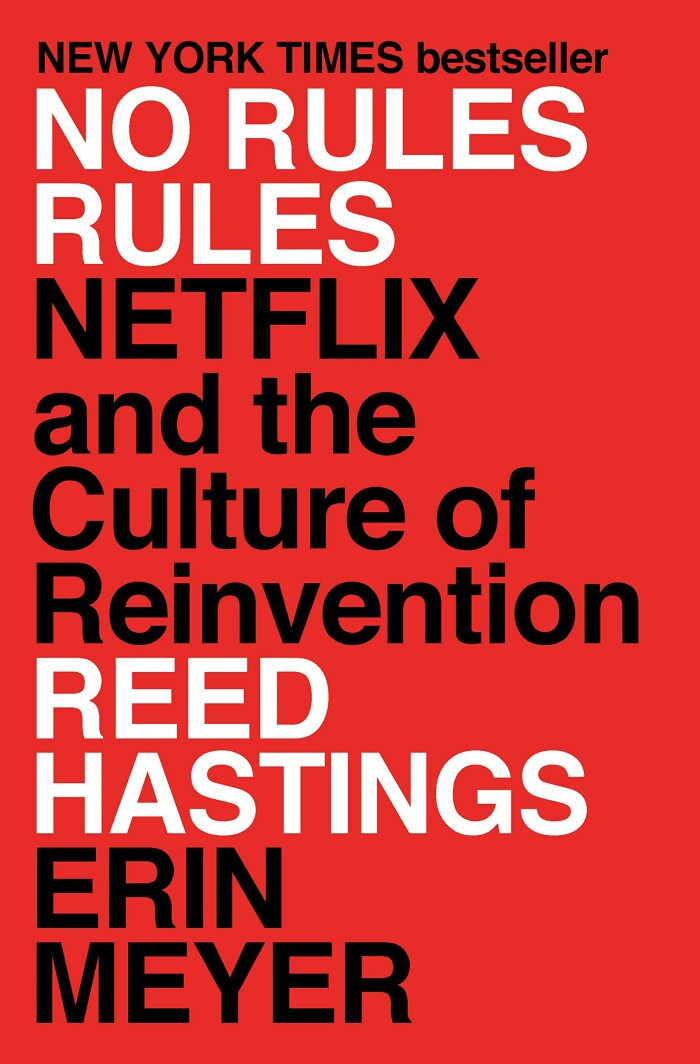
Support the author by purchasing this book with the link below!
PurchaseNo Rules Rules
Reed Hastings
Published: 2020
"No Rules Rules: Netflix and the Culture of Reinvention" is a book that explores the unique corporate culture at Netflix and how it has contributed to the company's success. The authors, Reed Hastings and Erin Meyer, argue that in today's fast-paced business world, companies need to be able to adapt and change quickly in order to stay competitive. To do this, they argue, companies need to embrace a culture of "freedom and responsibility," in which employees are given the autonomy to innovate and make decisions, but are also held accountable for their actions.
The book begins by discussing Netflix's origins as a DVD rental company and how it has evolved into a streaming giant. Hastings and Meyer explain how Netflix's culture of innovation has allowed the company to continuously reinvent itself and stay ahead of the curve.
One key aspect of Netflix's culture is its emphasis on high performance. The company has a "no rules" approach to management, which means that there are few formal policies or procedures in place. Instead, employees are trusted to do their best work and are given the autonomy to make their own decisions. This approach is supported by a system of continuous feedback and performance evaluations, which help to ensure that employees are held accountable for their actions.
Another important aspect of Netflix's culture is its focus on "candor," or honesty and transparency. The company encourages open and honest communication, even when it comes to difficult or sensitive topics. This helps to foster a culture of trust and collaboration, and allows for more efficient decision-making.
Throughout the book, Hastings and Meyer provide examples and stories from Netflix's history to illustrate how these cultural principles have contributed to the company's success. They also offer insights and advice for other companies looking to adopt a similar approach.
In conclusion, "No Rules Rules" is a fascinating look at how Netflix's unique corporate culture has helped the company achieve its impressive growth and success. It offers valuable insights and lessons for other companies looking to foster innovation and adaptability in their own organizations.
The book begins by discussing Netflix's origins as a DVD rental company and how it has evolved into a streaming giant. Hastings and Meyer explain how Netflix's culture of innovation has allowed the company to continuously reinvent itself and stay ahead of the curve.
One key aspect of Netflix's culture is its emphasis on high performance. The company has a "no rules" approach to management, which means that there are few formal policies or procedures in place. Instead, employees are trusted to do their best work and are given the autonomy to make their own decisions. This approach is supported by a system of continuous feedback and performance evaluations, which help to ensure that employees are held accountable for their actions.
Another important aspect of Netflix's culture is its focus on "candor," or honesty and transparency. The company encourages open and honest communication, even when it comes to difficult or sensitive topics. This helps to foster a culture of trust and collaboration, and allows for more efficient decision-making.
Throughout the book, Hastings and Meyer provide examples and stories from Netflix's history to illustrate how these cultural principles have contributed to the company's success. They also offer insights and advice for other companies looking to adopt a similar approach.
In conclusion, "No Rules Rules" is a fascinating look at how Netflix's unique corporate culture has helped the company achieve its impressive growth and success. It offers valuable insights and lessons for other companies looking to foster innovation and adaptability in their own organizations.
1. A culture of "freedom and responsibility" can foster innovation and adaptability. By giving employees autonomy to make decisions and take risks, and holding them accountable for their actions, companies can create an environment that encourages innovation and allows for rapid adaptation to change.
2. Continuous feedback and performance evaluations are important for maintaining high performance. At Netflix, employees are given regular feedback and evaluations, which helps to ensure that they are held accountable for their work and are motivated to perform at their best.
3. Honesty and transparency, or "candor," can foster trust and collaboration. By encouraging open and honest communication, even when it comes to difficult or sensitive topics, companies can create a culture of trust and collaboration, which can lead to more efficient decision-making.
4. Embracing change and continuous reinvention is essential for long-term success. Companies that are able to adapt and change quickly in response to market trends and customer needs are more likely to thrive in today's fast-paced business world.
5. To create a culture of innovation and adaptability, it is important to align cultural values with business goals. At Netflix, the company's cultural principles, such as its focus on high performance and candor, are closely aligned with its business goals, which has helped the company achieve its impressive growth and success.
2. Continuous feedback and performance evaluations are important for maintaining high performance. At Netflix, employees are given regular feedback and evaluations, which helps to ensure that they are held accountable for their work and are motivated to perform at their best.
3. Honesty and transparency, or "candor," can foster trust and collaboration. By encouraging open and honest communication, even when it comes to difficult or sensitive topics, companies can create a culture of trust and collaboration, which can lead to more efficient decision-making.
4. Embracing change and continuous reinvention is essential for long-term success. Companies that are able to adapt and change quickly in response to market trends and customer needs are more likely to thrive in today's fast-paced business world.
5. To create a culture of innovation and adaptability, it is important to align cultural values with business goals. At Netflix, the company's cultural principles, such as its focus on high performance and candor, are closely aligned with its business goals, which has helped the company achieve its impressive growth and success.
"No Rules Rules: Netflix and the Culture of Reinvention" is a book by Reed Hastings, the co-founder and CEO of Netflix, and Erin Meyer, a professor at INSEAD. The book explores the unique corporate culture at Netflix, which is known for its focus on innovation and its unconventional approach to management. Hastings and Meyer argue that in today's fast-paced business world, companies need to be able to adapt and change quickly in order to stay competitive. To do this, they argue, companies need to embrace a culture of "freedom and responsibility," in which employees are given the autonomy to innovate and make decisions, but are also held accountable for their actions. Through stories and examples from Netflix's history, the book shows how this approach has helped the company achieve its impressive growth and success.
Recent Readers
3 people have read this book.-
fulcrum-security
Read on: Dec 29, 2022
-
wsrl-bot
Read on: May 12, 2023
-
kapish
Read on: Jan 08, 2026
Reviews
-

A Fascinating Look at Netflix's Culture of Innovation and Adaptability
Published 3 years ago by fulcrum-security
"No Rules Rules: Netflix and the Culture of Reinvention" is a fascinating and informative book that offers valuable insights into the unique corporate culture at Netflix and how it has contributed to the company's success. In the book, the authors, Reed Hastings and Erin Meyer, provide numerous examples and stories from Netflix's history to illustrate...
Read Review
